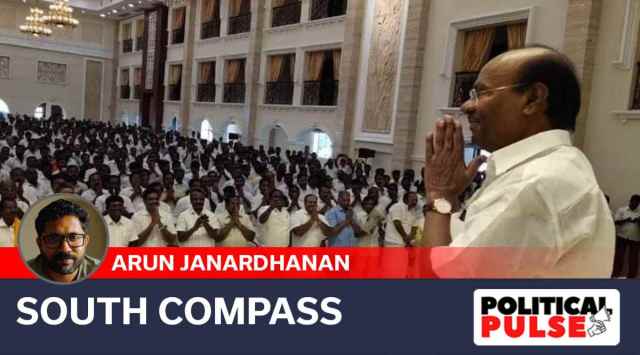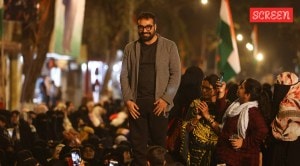Ramadoss prepares to pass the baton, but is PMK 2.0 ready for the race?
A party born of TN's anti-Brahmin movement, it is now too closely associated with caste violence and Vanniyar dominance, even as Anbumani seeks to expand base
 S Ramadoss, the founder of the Pattali Makkal Katchi (PMK)
S Ramadoss, the founder of the Pattali Makkal Katchi (PMK) ON THE occasion of his 84th birthday earlier this week, S Ramadoss, the founder of the Pattali Makkal Katchi (PMK), released an open letter to his party workers and well-wishers.
In the emotional letter – a retrospection of the political journey the PMK has been through – Ramadoss articulated an ambitious vision for his political party, which is seen as a representative of the OBC Vanniyars in the state, and said that every community should receive representation proportionate to its population.
With the BJP’s rise in the state putting Tamil pride to the fore, Ramadoss also made a strong pitch for Tamil Nadu, saying he wanted to see the Tamil language become a defining feature of the state’s administration, to ensure stringent environment protection and conservation so that “not a single drop of rain that falls in Tamil Nadu is wasted into the sea”, to enforce a total ban on alcohol and tobacco, and to see preference for native Tamils in government jobs and educational facilities.
However, more than his hopes, it was his lament that hit home. Ramadoss wrote that one question continues to haunt him: “When will the PMK capture power in Tamil Nadu?”
That possibility seems remoter by the day, as the PMK gets pushed to the margins by the two Dravidian parties in the state, with poor performance across recent elections. It held a vote share of 4% at last count, though its aim is to form a PMK-led alliance for the 2026 state polls.
From 20 MLAs once, it came down to 3 in 2011, 0 in 2016 and rose up to 5 as part of the NDA in 2021. In the Lok Sabha polls, while in 2009, it won 0 seats, its tally in 2014 was 1, going back down to nil in 2019.
In his letter, Ramadoss wrote that when the party was launched in 1989, he believed they would win the next election in 1991. And that they would have won at least 50 seats in that election, but for the assassination of Congress leader Rajiv Gandhi in Tamil Nadu.
The Rajiv assassination was a setback for all parties seen as supportive of Tamil sentiments, including the PMK.
Now, at a time when the PMK is a part of the AIADMK-led NDA alliance in the state, and given the history of the complicated relationship between the Vanniyars and Dalits, the future prospects of the party remain unclear.
The PMK has not managed to shed its association with the intense caste riots against Dalits in the state, especially in Dharmapuri and Villupuram districts. Or the memory of 2013, when Ramadoss accused Tamil Nadu cinema of “inspiring Dalit boys to pursue girls from other communities” and of “glorifying inter-caste marriages”.
At a time of rising Dalit mobility, weakening the old caste barriers, and the stagnation of the Vanniyars in comparison, the PMK seems out of step with the change.
And yet, the PMK too rose as part of a movement for social justice. As one of the largest and most consolidated backward communities in the state, the Vanniyars along with other groups were a part of the anti-Brahmin movement in the state.
In the 1980s, the Vanniyars waged several agitations, seeking reservation for the community, often ending in violence, police firing and clashes, and claiming lives of several protesters. Their demand was 20% quota for Vanniyars in both state and central government jobs.
One road blockade announced by the Vanniyars in May 1986 brought the entire state to a halt. A one-day blockade of trains followed in December 1986. The peak was in September 1987, when road traffic in northern Tamil Nadu was halted for an entire week. Vanniyar protesters would cut trees on sides of highways and lay them across the roads to ensure the blockade; J Guru, later a PMK leader and two-time MLA, came to be known by the prefix ‘Kaduvetti (tree cutter)’.
In 2021, after it came to power, the DMK government announced the construction of a memorial in Villupuram for people killed during one such clash in 1987.
It was Ramadoss’s leadership that steered this Vanniyar movement into an effective political weapon. Soon, the Other Backward Classes (OBC) quota came to be sub-categorised as Backward Classes (BCs) and Most Backward Classes (MBCs). In 1989, the year the PMK was launched, the DMK government led by M Karunanidhi categorised the Vanniyars as MBC, and granted them separate 20% reservation in state jobs.
It’s a sweet irony, Ramadoss’s critics say, that he now talks of a casteless society and social justice.
However, the 84-year-old is also preparing the ground to pass on the baton to his son, Dr Anbumani, who still enjoys some national recognition for the public health reforms during his term as Union Health Minister under the UPA government, including the launch of the National Rural Health Mission and the prohibition of smoking in public.
Elevated as PMK president last year in May, Anbumani wants to expand the party beyond its traditional base, which explains Ramadoss’s appeal in his letter. However, Project ‘PMK 2.0’ is challenging as it entails not just political manoeuvring but a substantial shift in the PMK’s ideology built around its caste identity.
And then there is the association with the BJP, a party that the PMK is not too comfortable with (on Friday, the party chose to skip an Amit Shah rally in the state). But there is little space for it in the DMK alliance either due to the presence there of the VCK, the Dalit party led by prominent leader Thol Thirumavalavan, a bitter rival of the PMK.
Photos


- 01
- 02
- 03
- 04
- 05





























